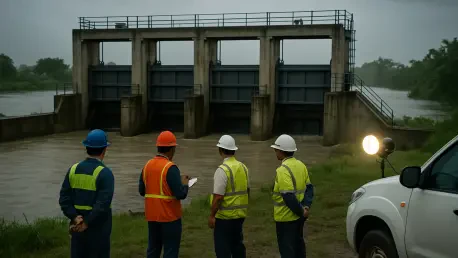In a nation frequently battered by typhoons and flooding, the Philippine government’s efforts to mitigate natural disasters through flood control projects have come under intense scrutiny, revealing potential mismanagement of public funds. The Senate, acting on a directive from President Ferdinand “Bongbong” Marcos Jr. during his State of the Nation Address, has launched a comprehensive investigation into these initiatives. Spearheaded by the Blue Ribbon Committee, the probe targets irregularities in projects worth billions of pesos, with a staggering 20 percent of contracts, valued at P100 billion, awarded to just 15 contractors. This concentration of funds raises serious questions about fairness and transparency in the bidding process. As the inquiry unfolds, allegations of ghost projects and dubious contractor affiliations have surfaced, casting a shadow over the integrity of critical infrastructure meant to protect vulnerable communities. The urgency of addressing these concerns cannot be overstated in a country where floods claim lives and livelihoods with alarming regularity.
Uncovering Contractor Accountability
The heart of the Senate investigation lies in holding contractors accountable for their role in flood control projects, many of which appear plagued by inconsistencies. A key figure in the probe, Sarah Discaya, a former Pasig City mayoral candidate and president of Alpha and Omega Gen. Contractor & Development Corp., has drawn attention due to her alleged connections to multiple firms. Despite being invited to an initial hearing on August 19, Discaya did not attend, citing prior commitments, as did representatives from several other companies like Topnotch Catalyst Builders Inc. and Sunwest Inc. Notably, St. Timothy Construction Corp., reportedly linked to Discaya through shared business addresses, also failed to send a representative. Of the 15 contractors summoned, only seven appeared, prompting Senator Bato dela Rosa to push for subpoenas for the absentees—a motion swiftly approved by Committee Chair Senator Rodante Marcoleta. Non-compliance in future hearings could lead to contempt citations, signaling the Senate’s resolve to enforce transparency in these critical public works.
Addressing Systemic Flaws in Infrastructure Governance
Beyond individual contractor accountability, the Senate probe has exposed deeper systemic issues within the management of public infrastructure projects in the Philippines. The focus on ghost projects during the hearings, coupled with the grilling of Department of Public Works and Highways officials, highlights potential mismanagement or even fraudulent practices that could undermine efforts to combat flooding. Allegations by Pasig City Mayor Vico Sotto regarding connections between firms like St. Timothy Construction Corp. and Discaya, despite her denials, point to possible conflicts of interest that demand thorough investigation. The broader concern is the erosion of public trust in government-led initiatives if these irregularities are not addressed. The Senate’s swift action to compel attendance and investigate misconduct reflects a consensus among leaders on the need for stringent oversight. Looking back, the issuance of subpoenas and the intense scrutiny during the hearings underscored a pivotal moment in ensuring that public funds are used responsibly to safeguard communities against natural disasters.









